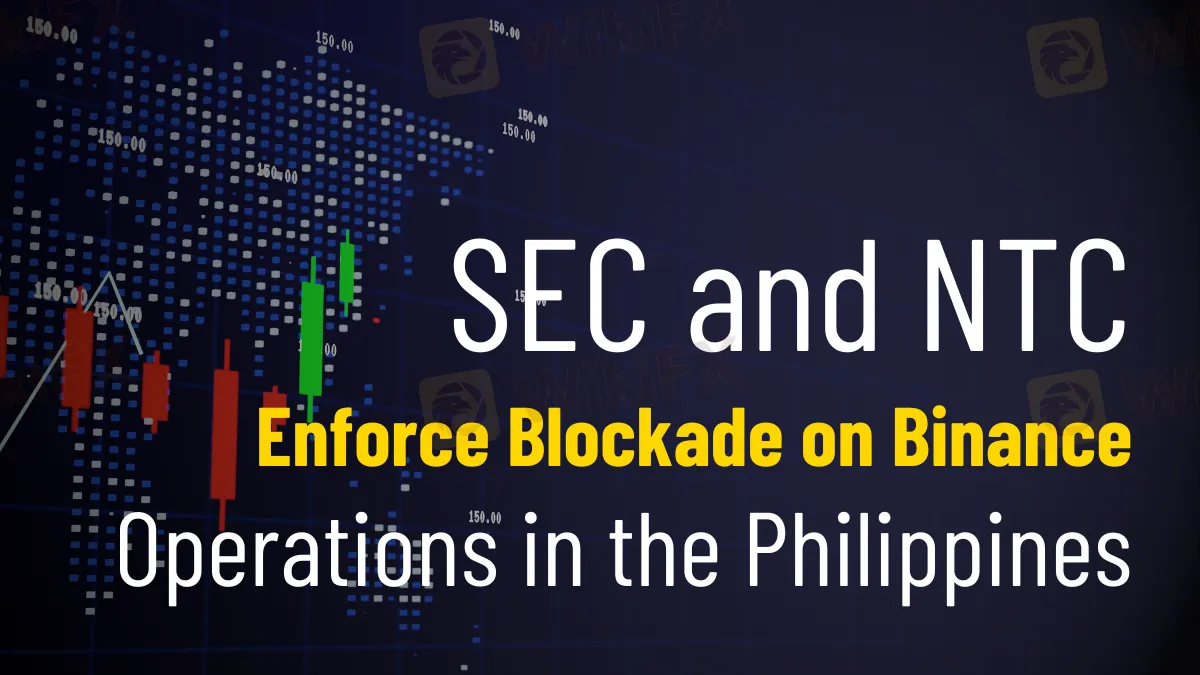简体中文
繁體中文
English
Pусский
日本語
ภาษาไทย
Tiếng Việt
Bahasa Indonesia
Español
हिन्दी
Filippiiniläinen
Français
Deutsch
Português
Türkçe
한국어
العربية
SEC and NTC Enforce Blockade on Binance Operations in the Philippines
Abstract:Philippines' SEC, with NTC's aid, blocks Binance, impacting its global cryptocurrency operations due to lack of proper licenses, aiming to protect local investors.

The Philippines' Securities and Exchange Commission (SEC) has shut down Binance's website and networks, affecting the world's biggest cryptocurrency exchange. After the March 12 SEC meeting, Binance operates without domestic trading and investment platform authorization. The SEC could not keep this ban operating on itself, so it asked the National Telecommunications Commission for help.
Binance is known worldwide for its financial products. Leveraged spot trading, futures and options contracts, cryptocurrency savings accounts, staking services, and ICO platforms are instances. Binance trades over 402 coins daily, averaging $65 billion thanks to its 183 million daily users.
SEC's primary concern is to protect Filipino investors from the risks associated with keeping Binance's services open to the public. Because it failed to get the required licenses to solicit public investments or operate a securities exchange, the regulatory body stressed that Binance had violated Republic Act No. 8799, also known as The Securities Regulation Code (SRC). Companies that run securities exchanges and seek public investments in the Philippines must required to get licenses under this legislation.

Despite its extensive global network and several services, Binance faces significant regulatory challenges due to its operation in the Philippines without an SEC license. No one should utilize or invest in Binance, the SEC warned as far back as November 2023. Amid a broader effort to halt the spread of illegal investment opportunities online, the SEC shut down OctaFX and MiTrade in February. The protected interest of Filipino investors was the driving force behind this undertaking.
There has been no ignoring Binance's efforts to attract Filipino customers, as the company has launched massive advertising campaigns on many social media platforms. Now that the Binance app is available in both the Google Play Store and the Apple App Store, it is reaching a wider audience of prospective Pinoy investors.
In light of these events, the SEC wasted no time granting Filipino investors a grace period during which they may transfer their cash out of Binance and onto other certified platforms and products. This strategy protects investors while maintaining the integrity of the Philippines' financial markets.
Account holders assert that Binance's standing with the regulatory bodies in the Philippines has improved after the SEC's moves.
Bans on Binance by the SEC and NTC have marked a turning point in the Philippines' efforts to rein in the booming cryptocurrency industry. To companies operating in the financial services sector, it serves as a timely reminder of the critical need to comply with local legislation, especially in industries as fluid and rapidly evolving as bitcoin investment and trading.

Disclaimer:
The views in this article only represent the author's personal views, and do not constitute investment advice on this platform. This platform does not guarantee the accuracy, completeness and timeliness of the information in the article, and will not be liable for any loss caused by the use of or reliance on the information in the article.
Read more

Anti-Scam Groups Urge Tougher Action on Fraudsters in UK
Anti-scam groups demand tougher police action on fraudsters as UK fraud rates surge 19%, targeting millions in a penalty-free crime spree exposed by a $35m scam leak.

Philippines Deports 29 Indonesians Linked to Online Scam Syndicate in Manila
Online scam groups in the Philippines trick Filipinos into gambling and love scams, from Manila to Bacolod, causing trafficking and pain as police fight back.

How Reliable Are AI Forex Trading Signals From Regulated Brokers?
Discover how reliable AI Forex trading signals are and why using a regulated broker boosts their effectiveness. Learn key factors to evaluate accuracy and enhance your trading.

Top Currency Pairs to Watch for Profit This Week - March 31, 2025
Discover the top 5 currency pairs to trade for profit this week, March 31, 2025—USD/JPY, EUR/USD, GBP/USD, AUD/USD, USD/CHF—with simple strategies and best times.
WikiFX Broker
Latest News
How Crypto Trading Transforms FX and CFD Brokerage Industry
UK would not hesitate to retaliate against US tariffs - No 10 sources
FCA Warns Against 10 Unlicensed or Clone Firms
CySEC Warns Against 14 Unlicensed Investment Websites
Top Currency Pairs to Watch for Profit This Week - March 31, 2025
Will natural disasters have an impact on the forex market?
Philippines Deports 29 Indonesians Linked to Online Scam Syndicate in Manila
Navigating the Intersection of Forex Markets, AI Technology, and Fintech
Exposed: Deceptive World of Fake Trading Gurus – Don’t Get Fooled!
AI-Powered Strategies to Improve Profits in Forex Trading
Currency Calculator







